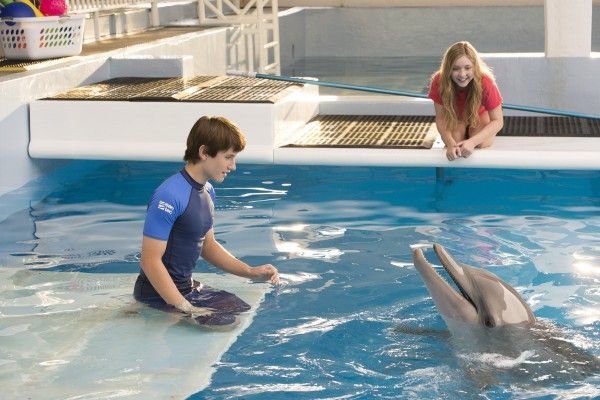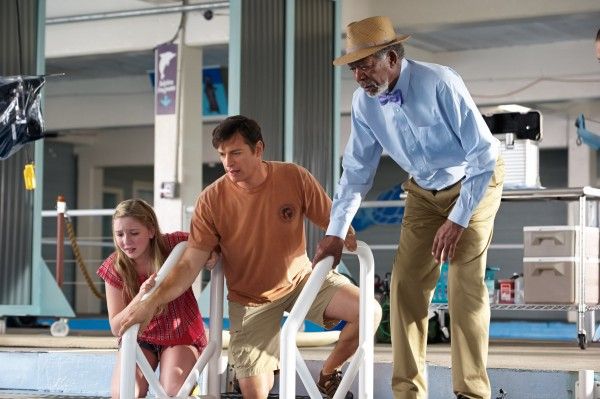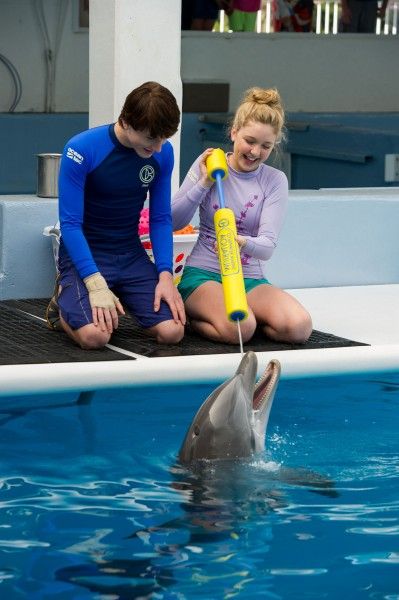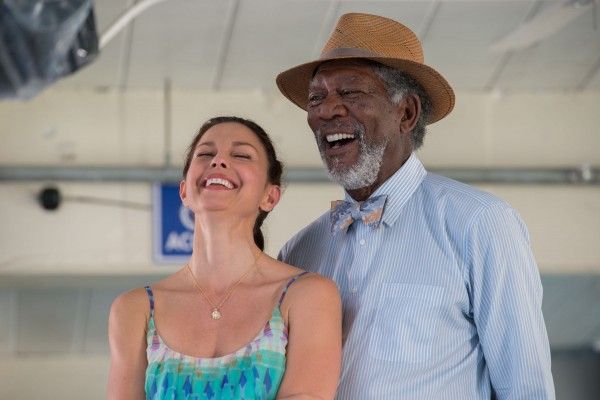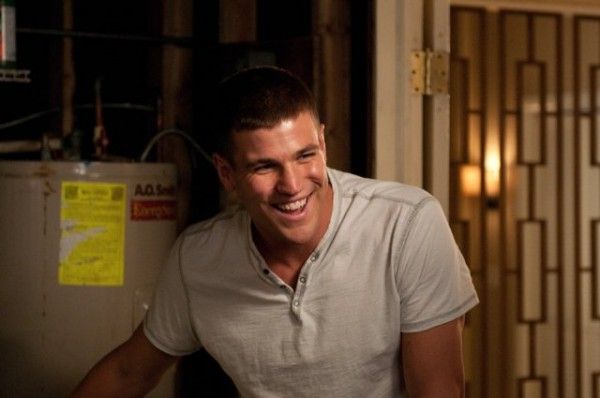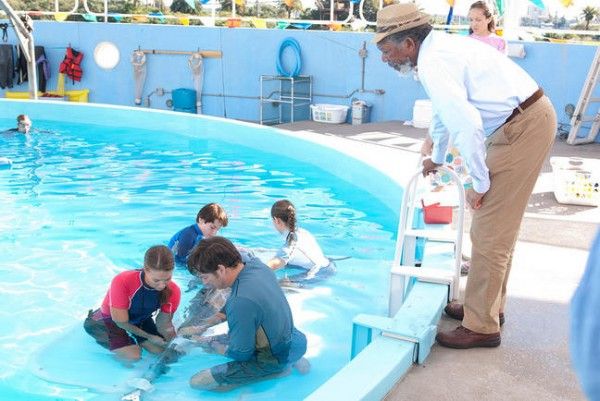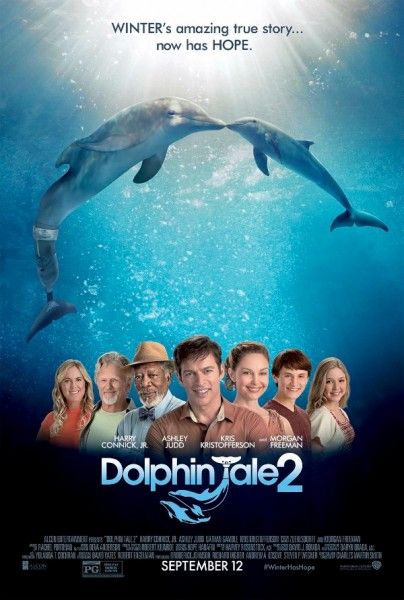The career trajectory of Charles Martin Smith has been a fascinating one to watch. The perennial character actor (supporting roles in American Graffiti, Starman & The Untouchables) slowly transitioned behind the camera, helming such genre fare as Trick or Treat and Fifty/Fifty. Since then, Smith has transitioned to directing more topical dramas: The Snow Walker & Stone of Destiny – before finding commercial success with the family-friendly Dolphin Tale. The surprise success of Dolphin Tale, the film grossed more than 70 million domestically, has not only spawned a sequel opening this weekend but also helped to establish an aquarium (The Clearwater Marine Aquarium) that houses Winter and Hope, the titular aquatic stars of both Dolphin Tale films.
In the following interview with Charles Martin Smith, the writer/director discusses the darker adult themes of Dolphin Tale 2, the writing process behind the sequel and his approach to working with child-actors. In addition, Smith discussed his career as an actor and what precipitated his shift away from acting towards directing. Hit the jump more my Dolphin Tale 2 interview with Smith.
Collider: How was Dolphin Tale 2 pitched to you? Or was this something you yourself pitched?
CHARLES MARTIN SMITH: No -- it wasn't pitched to me. It came out of discussions with Andrew [Kosgrove] and Broderick [Johnson] -- the producers. I know David Yates [Executive Producer] at the [Clearwater Marine] Aquarium really wanted a sequel because it’s a big source of cash revenue for them.
I would think so…
SMITH: Andrew, Broderick and I all said what would the film be about? And I just started thinking about it. I thought the rescue of Hope – a baby dolphin - was pretty dramatic. If you did a sequel you'd have to put that in… but that's not a movie. That's an incident. It's a scene but it's not a story. So then I started thinking ‘Well -- I had these two scenes I cut out of the first film: a dolphin release and a pairing scene.’ That’s three scenes. But what would it be about? So I started thinking about it and cooking it up and chatting and talking about it. Andrew Broderick said ‘Well --look go try to write a story, come up with a treatment idea and we're open to it if you think of something.’
Had you done a rewrite on the first film previously?
SMITH: Yeah -- I largely rewrote [Dolphin Tale].
So when you're doing a sequel and you're writing it, how closely do you try to emulate the structure of the first film?
SMITH: A lot actually. I wanted to make sure if we did a sequel that for people who loved the first movie, [the sequel] would be like visiting an old friend. They come back and they see certain things they saw before. We'd have Rufus causing trouble and we'd have the underwater swimming – the ones I call the ballet sequences because they're doing all these turns and stuff. I wanted to have those familiar elements but then also introduce a bunch of new things. Take those familiar elements and do variations based on the theme. The other thing that really kicked me off for a story is the passage of time, this idea that time goes on, old dolphins die, young dolphins are born, aquariums change, kids grow up, nothing is ever going to be the same… I put it in that line of Hazel’s – “If you could turn the clock back to any time you wanted, would you?”
I mean those are pretty adult themes...
SMITH: They are. Exactly. I wanted to make it more of an adult movie because the kids are older. Let’s age this up a little bit.
Does making a movie about dolphins allow you to imbue a darker subject matter -- like loneliness or depression -- onto animals for a children's film?
SMITH: Absolutely. It does. It does. And I began to think of this less and less as a children's film. The first movie probably is more [a children’s film] but this one I was thinking these kids are teenagers. Adults are here. Let's get into some darker themes. Let's talk about death and loss. Writing the business of Panama's death and how they all deal with it, I thought man is this going to be too dark to bring little kids to -- because people are going to bring little kids to the movie -- but I said 'You know -- I want to write something that's a little more mature.’
How many drafts did you go through?
SMITH: Oh man -- probably around seven.
And how closely does the first draft resemble what made it to the screen?
SMITH: There were some things that stayed absolutely the way they were: the turtle release, the release of Mandy, the rescue of Hope… Those were all actually based on documentary footage. They chronicle everything that goes on at the aquarium. So I looked at all that footage. Those things didn't change that much. I think in later drafts, I did more conflict between the kids and the parents. I added to that as things went on. But it just got tighter and a little better and a little more interesting. You know what I tweaked a lot, back and forth, from draft to draft, was the character I played: the USDA guy. At first I'd written him and I wanted to make sure that he wasn’t a bad guy, just a guy doing his job. I did an early draft with that and then Andrew & Broderick read it and said 'He's too nice.' I went 'Oh -- Ok' and did another pass where he was more of a bad guy. Andrew said 'No, no, no -- now he's too bad.' So it was a constant back a forth…
We're you always going to play that character?
SMITH: No - I wasn't. Steven Wegner, who's Head of Creative... I worked with him on the scripts and the first [film’s] script too. One day he said, “You realize you've written a part, you should play?” I thought ‘Have I?’ As a writer, I feel like I'm part of every character. I mean Rufus is part of me. I'm in all these things.
When you're writing a screenplay and you know that you're going to direct it, how does that influence the writing process?
SMITH: Hugely. It's great. I've done it a number of times. Almost everything I've directed, I've either done a big rewrite or written it from scratch. And that makes a big difference because I see the movie in my head and I 'm putting down on the page the scenes that I see. It's really helpful. You know what was great about this one too -- this is the only time I've written a script where I knew every actor who was going to play the part. That's cool because I can hear Morgan [Freeman] saying his lines…
When you're writing two separate storylines -- one for the dolphins and one for the humans, how important is it that the two stories correlate thematically?
SMITH: It's all part of the same thing. Having done the first movie, I understood how to blend those things. One of the concerns I had in this movie -- a writing concern by the way -- the inciting incident is Panama's death and then Winter is depressed and I knew Act Three was going to be putting Hope in with Winter but I thought for the entire middle of the movie I've got Winter bummed out, hiding out under a platform.
People are paying to see Winter...
SMITH: Yeah -- people pay to come see Winter and what have I done with her? She's depressed, she's hiding under a platform, she won't come out... So I thought 'Oh man -- how am I going to get away with this?' But then I came up with a couple of [scenes] that helped. One of them was the veteran scene where he goes down and comes to the window and looks at Winter. And of course the scene where [Winter] smacks the kid... But it was tricky keeping Winter in the movie when I had actually written her into a corner. As a storyteller - I'm like ‘Ahhh... I've painted myself into a corner with this dolphin.’ But then it also helped that I had Mandy -- this new character [dolphin] --- because then people could get a nice dolphin, jumping around.
I've noticed in your film career you've moved away from genre films like Trick or Treat or Fifty/Fifty towards more real life stories. Was that always something you wanted to move towards?
SMITH: Yeah -- I mean those early movies I did because they were the only movies I could get.
I figured as much.
SMITH: I'm not a particular fan of horror movies but it was the first feature I was offered.
Trick or Treat's a fine film…
SMITH: Thank you very much. It's not a particularly scary horror film. But it's more me. I had a lot of fun with Trick or Treat and some of the crazy stuff in there. It was a hoot. And the same with Fifty/Fifty. I was really learning a lot about filmmaking at that point. I'd done a couple of short films. I'd always been a writer - but I learned a great deal on those earlier films. Then I directed some television. Space: Above and Beyond and Buffy the Vampire Slayer. As I went along, I found my groove as a filmmaker.
Looking to Brian De Palma [whom Smith worked with on The Untouchables] or Carol Ballard -- what do you learn working as an actor with directors of such a caliber?
SMITH: And George Lucas on American Graffiti.
Of course…
SMITH: I watched and I observed and I learned a lot from all of them. The one I probably learned the most from was Carol Ballard because I was on that project...
Never Cry Wolf is terrific…
SMITH: Thank you. Carol Ballard is an absolute genius. After we filmed the movie, I think his first cut was four hours and there's almost no dialogue. It's just me looking at a bunch of wolves and running around. There's no dialogue. You couldn't tell what was going on. So Carol called me and said 'You got to get down here and do some narration. Why don't you sit with me and we'll write some narration and then [we’ll have you] narrate it. Just come down here for a couple weeks to the cutting rooms and we'll write the stuff.' So I went down and I was there a year -- almost a year and a half after he said come down for a couple weeks... But while I was there, I sat in the editing room as he was cutting and re-cutting the movie. I would write a cue for a voice over and I would read it as a temp thing and he would cut the scene to that. I sat there and I watched. I remembered how we shot it all but I had never really spent that much time in the editing room so that movie was like a one-on-one tutorial on how to make a movie. I learned so much -- so for three years of my life, I didn't do anything but work on Never Cry Wolf.
Was that the shift from acting to directing for you?
SMITH: It was. I had been a directing student at the university. I had always thought while I was in college my future would be in directing theater which is what I really wanted to do. Go to Shakespeare festivals and direct Shakespeare and all that stuff. I studied all that. I had some really great directing teachers. And my dad was an animator and he worked in film… but it was really Never Cry Wolf -- sitting there in post when I thought "Oh yeah -- I get this. I can do this. I can make a movie." And that's when I headed towards being a filmmaker.
As an actor yourself, how does that effect your approach with actors?
SMITH: I had the most amazing acting teacher when I was young named Nina Foch - who had been a starlet in the 40s and 50s. She was one of the top acting teachers and I learned an enormous amount from her about acting and just basic principles and translating those into directing. She studied with Sanford Meisner, Uta Hagen and Lee Strasberg. Hollywood was full of people that she taught and I learned so much from her. I think that’s one reason why I'm successful in directing children for instance because I can be an acting teacher not just a director. I know what to say to them -- particularly with Cozi [Zuehlsdorff]. Before the scene in which she demands to see the files and says “I'm not a little girl anymore”, I really worked with her about how to play that and what to think about and stillness. Acting classes - I love that. I love being an acting teacher. Totally love it.
Do you find yourself varying your approach to different actors and how you speak to them?
SMITH: Absolutely -- you talk to each [actor] differently. You know on the first movie, Cozi had never done anything. When I cast her, she had zero film credits. She had only done a little community theater in Orange County -- church shows and Annie. So she didn't know anything about film. She didn't know about hitting marks. She didn't know about getting in front of the lens. So on the first movie, I directed her like she was a stage actress. I talked to her in stage terms. I'd say ‘Can you come a little down stage? Can you go a little stage left, stage right?’ I didn't use camera terms, only stage terms. I'd say 'Can you just open up and play out a little bit more?’ because she knows all that terminology. I talked to her totally different than I did anybody else because she had never done a film before.
Dolphin Tale 2 is now in theaters.


